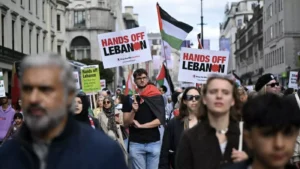A year on, the Palestine solidarity movement must adapt to a widening Middle East war

Pro-Palestinian activists and supporters in central London during a march for Palestine on 5 October 2024
John Rees writes in Middle East Eye
On the first anniversary of Israel’s war on Gaza, the Palestine solidarity movement held its 21st national demonstration. Some 300,000 joined the march, according to organisers, making it one of the largest protests of the past 12 months.
Not that any of the marches have been small by historical standards. The smallest of them was 100,000 strong; the largest, on Armistice Day last year, attracted over 800,000 people.
Certainly, in the pre-Iraq war days, any cause that mobilised 200,000 people, such as the largest of the Vietnam war protests, the poll tax march of 1990 or CND’s 1983 anti-cruise missile demonstration, was considered huge. But the Palestine movement has transformed the metric because no other cause this century has mobilised so many, so often, over such a short period.
There have been other forms of protest, particularly those involving industrial action, that have had dramatic effects: the miners’ strike of 1984-85; the strikes of the early 1970s that brought down the Edward Heath government; the General Strike of 1926; the Great Unrest before the First World War.
But purely in terms of mass street demonstrations, only the Iraq war protests, the suffragettes or the Chartists come to mind.
Imperial powers
However, this historic movement is facing two new challenges: one analytical, the other tactical.
The analytical challenge arises from the transformed nature of the war in the Middle East. A year ago, Israel’s war was on Gaza alone. Now Israel is intensifying its offensives against Palestinians both in Gaza and the West Bank, against the Lebanese, whose country it has bombed relentlessly and now invaded, and against Syrians and Yemenis, both of whom are being bombed by Israel, and against Iran, a conflict that could become the most serious and consequential of all.
Israel’s ability to begin a regional conflict without serious interdiction by the “international community” is a development which requires explanation.
